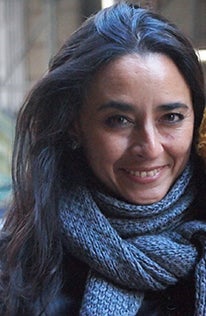Exposing Gender Absurdities
 January 19, 2016—Alumna Soraya Chemaly (C’88) is a writer and activist, whose work focuses on the role of gender in culture. Her writing explores topics such as gender, race, media, free speech, online harassment, and sexual and domestic violence. She is also the director of the Speech Project at the Women’s Media Center, an organization that works to “make women visible and powerful in the media.” We sat down with Chemaly to talk about her current work.
January 19, 2016—Alumna Soraya Chemaly (C’88) is a writer and activist, whose work focuses on the role of gender in culture. Her writing explores topics such as gender, race, media, free speech, online harassment, and sexual and domestic violence. She is also the director of the Speech Project at the Women’s Media Center, an organization that works to “make women visible and powerful in the media.” We sat down with Chemaly to talk about her current work.
Georgetown College: You’ve written on many topics related to college campuses, such as trigger warnings on certain material in course curriculums. For those unfamiliar trigger warnings, can you explain why they can be necessary?
Soraya Chemaly: Trigger warnings were uses a lot in feminist spaces because those were the only spaces where things like intimate partner violence and rape were discussed. It became very clear in a space where we were discussing those things that enough women had experienced them that they were being blindsided, “triggered,” [or] retraumatized. So in those spaces—I think as an indication of compassion and empathy—it became part of the culture to say, “Hey everybody, we’re going to be talking about this, just ‘heads up’ so you can prepare yourself.’” [With trigger warnings,] people aren’t saying you can’t talk about the subjects. They are saying, “Please talk about that subject with care or empathy or allow me not to be there,” which is different.
GC: As trigger warnings have become a topic of wider public debate, what concerns do you have about the way we are discussing trigger warnings, trauma, and the classroom?
SC: I think what is deeply concerning is not so much the demand that “yes let’s have trigger warnings”—no one is asking that they be mandatory—but the rejection of why they are necessary. I think they are a good thing, because they indicate to me that campuses are robustly discussing issues that were not discussed before.
It used to be that you could be in a classroom that was not very diverse. Our institutions were built on spaces that were filled with young white men, so discussing slavery and rape had different connotations. But when you have a much more diverse space, you benefit from acknowledging that the content that you are learning about or reading about is still living content. It’s still very relevant in people’s lives.
GC: In addition to writing, you’re also the director of the Speech Project, a new initiative at the Women’s Media Center. What do you hope to achieve with the Speech Project?
SC: We want to take what the Women’s Media Center does and incorporate what’s happening online—in terms of women’s representation, freedom of speech, [and their] ability to participate in the public sphere. And we really want to draw the important connections between what happens online and what happens offline, for example, anonymity. If you ask the average person they would say that anonymity is a horrible thing, and we should get rid of it online, and that is true. [But] anonymity is important for certain writers in certain places. It’s important for transwomen. There are all these places where anonymity is valuable, so we need a more complex and nuanced approach to understanding things like real names and anonymity online.
We [also] want to raise awareness about what online harassment is. The full spectrum of what we are talking about is enormous and is directly related to offline violence. Direct connections to free speech are easily made, but people don’t think this kind of violence as an infringement on [women’s] rights of free speech, which they are. And it’s very hard to prove a negative. You can’t capture a loss of speech that’s happening.
GC: You recently gave a Tedx talk on “The Credibility Gap: How Sexism Shapes Human Knowledge.” What advice do you have for undergraduate students at Georgetown who want to learn more about gender, race, and culture?
SC: I would urge students to think about free speech much more broadly in terms of socialization, medium monopolization, corporatization, and all of these things that go into constraining the speech of marginalized people. For college students who aren’t paying attention to gender or intersectionality, if they are genuinely curious people who want to do good, they need to immerse themselves in those ideas. They can’t wait for someone to spoonfeed them that information because it will never come to them. There are fantastic professors, students, and people doing this work. You just have to go seek it out, and I would urge people to do so.
Related Information
Read more from Soraya Chemaly with her articles at Time and The Huffington Post. Follow Chemaly on Twitter, @schhemaly.
- Tagged
- Alumni